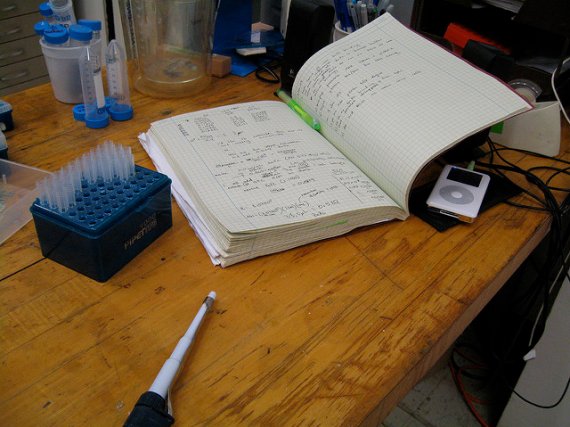Photo: a conventional lab journal (credit)
Food Process Engineering is among the pioneers. Staff members, PhD researchers and students at this lab have been keeping records of their work using the programme OneNote since last September. OneNote is a digital notebook which was not developed specifically for use by scientists. Notes can be illustrated with photos and supplemented with PDFs. All the data is synchronized between gadgets, and is searchable and shareable. The researchers were also given a tablet so they could make notes anywhere.
‘And we are pleased with that,’ says Maurice Strubel, education and research officer at Food Process Engineering. With a few exceptions, everyone uses the tablet. Strubel is also working on digital protocols – often illustrated with photos – which are shared with students. ‘It isn’t perfect of course,’ says Strubel. It would be nice, for instance, if OneNote could read data directly from the measuring equipment.
There is too much diversity in the requirements, wishes and needs.
Marco Otte, service manager at FB-IT
Strubel is pioneering in this field independently of the IT department at Wageningen UR. But this department is involved in a pilot with digital research notes at the Agrotechnology and Food Sciences Group (AFSG) and the Plant Sciences Group (PSG), says service manager Marco Otte. Five chair groups were introduced to elabJournal and the related eLabInventory.
The IT department has deliberately not established a centralized standard or blanket policy. ‘Anyway, that is not up to us; it’s up to the Sciences groups,’ says Otto. ‘There is too much diversity in the requirements, wishes and needs.’ He does hope, however, that chair groups will consider making use of eLabJournal. It would be a pity, he feels, if everyone sets about reinventing the wheel. Secondly, IT stores all data in Wageningen whereas a lot of commercial software works ‘in the cloud’. You cannot always be sure how safe data is there, and to what extent the company in question and others can access it. ‘So give careful thought to whether you have sensitive data,’ says Otto.

